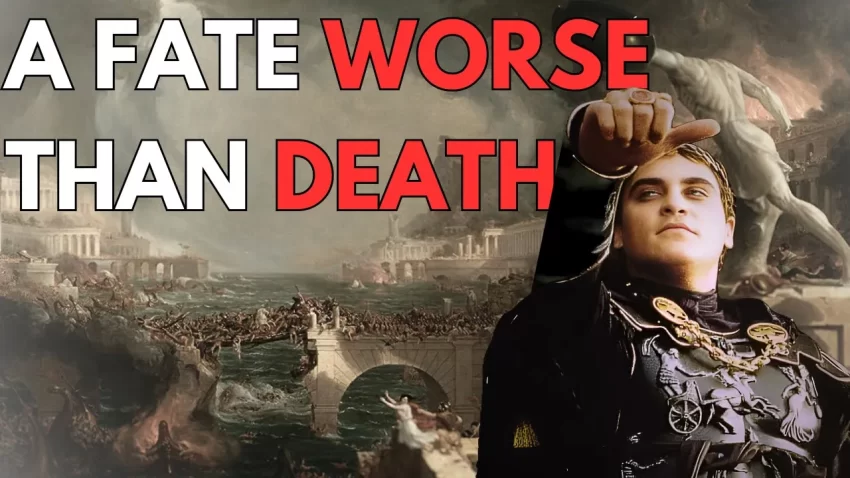TLDR
The concept of a “fate worse than death” has profound implications in storytelling. This phrase can be used as a literary device to delve deeper into characters’ psyches, creating emotional tension and investment. By exploring what characters fear more than death, writers can develop richer narratives. Character deaths can evoke strong reactions from audiences, but alternatives that reflect psychological torment or moral dilemmas can also be deeply impactful. This post explores how to craft these narratives effectively and highlights examples from literature and film.
The Historical Context of “Fate Worse Than Death”
In the year 410 AD, Rome, the Eternal City, faced an unprecedented event: the first sacking by foreign invaders in 800 years. This moment marked a significant decline of the Roman Empire, leading to a psychological impact on both the populace and leadership. The unthinkable had occurred, and for many, this fate was worse than death itself. The phrase “fate worse than death” was popularized by Edward Gibbon in his seminal work The Decline and Fall of the Roman Empire, originally referring to the sexual mistreatment of women. Over time, it has evolved to describe experiences so undesirable that death seems preferable.
Literary Device: Exploring Characters’ Fears
This phrase can serve as a literary device for writers, allowing exploration of characters’ deepest fears and vulnerabilities. Understanding what a character perceives as a fate worse than death can lead to richer character development, enhanced emotional arcs, and increased audience engagement. As writers, we can create scenarios where characters strive to avoid such fates, heightening the stakes in our narratives.
The Emotional Impact of Character Death
Character deaths in fiction often elicit complex reactions. Audiences may both love and hate these moments, as they introduce real stakes and emotional weight. The reasons behind these reactions vary:
- Real Stakes: Death can create a sense of risk and urgency.
- Shock Value: Unexpected character deaths can turn the narrative on its head.
- Emotional Resonance: Gut-wrenching farewells can leave a lasting impact.
- Character Development: The death of a beloved character can redefine the arcs of those remaining.
Crafting a Fate Worse Than Death
As writers, we have the power to shape our characters’ experiences in ways that resonate deeply with audiences. Here are several scenarios that can effectively convey a fate worse than death:
- Loss of Honor: Characters may face situations where they must choose between their life and their honor. For example, in the film The Duelists, two military officers engage in a series of duels over the course of years, where losing the fight signifies losing their honor—an outcome they cannot bear.
- Psychological Torment: In H.P. Lovecraft’s stories, characters often endure horrific experiences that lead to madness instead of death, such as in Dagon, where a soldier escapes but loses his sanity, facing a fate worse than death.
- Forced Immortality: In Hyperion, the character Father Hoy experiences a fate worse than death due to a cruciform that grants him immortality at the cost of his mental stability, illustrating how prolonged suffering can be worse than death.
- Loss of Passion: In the film The Sound of Metal, the protagonist, Reuben, loses his hearing—his passion and livelihood—forcing him to confront a new reality. The emotional journey of overcoming this fate resonates powerfully with the audience.
Creating Tension and Stakes
By exploring what constitutes a fate worse than death for a character, writers can establish compelling stakes that go beyond mere survival. This involves understanding the essence of the character, their fears, and the psychological or moral dilemmas they face. These narratives can delve into themes of loss, identity, and redemption, enriching the overall story.
Common Pitfalls in Character Deaths
Killing off characters can backfire if not executed thoughtfully. Here are some pitfalls to avoid:
- Rushed Connections: Spending too much time on a character right before their death can feel contrived.
- Poor Foreshadowing: Lack of subtle hints can lead to deaths that feel unearned or out of place.
- Unestablished Stakes: If audiences don’t understand that characters can die, the impact is diminished.
- Fulfillment of Character Arcs: Characters who complete their arcs may leave audiences feeling that their deaths were unnecessary.
Conclusion: The Power of a Fate Worse Than Death
In storytelling, the concept of a fate worse than death serves as a powerful tool for writers. It allows for the exploration of characters at a deeper emotional level and enhances the thematic elements of the narrative. By crafting unique stakes and compelling scenarios, writers can engage audiences in profound ways, creating stories that resonate long after the last page is turned or the credits roll.
What are your thoughts on this topic? Have you encountered characters whose fates were worse than death? Share your insights in the comments!

What Poetry Feels Like
Original channel: https://www.youtube.com/channel/UC9R_q0yA1n6KpbXtIxcFGtg



